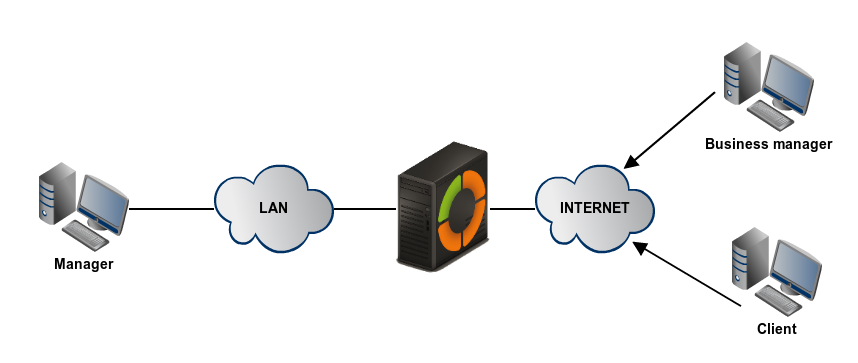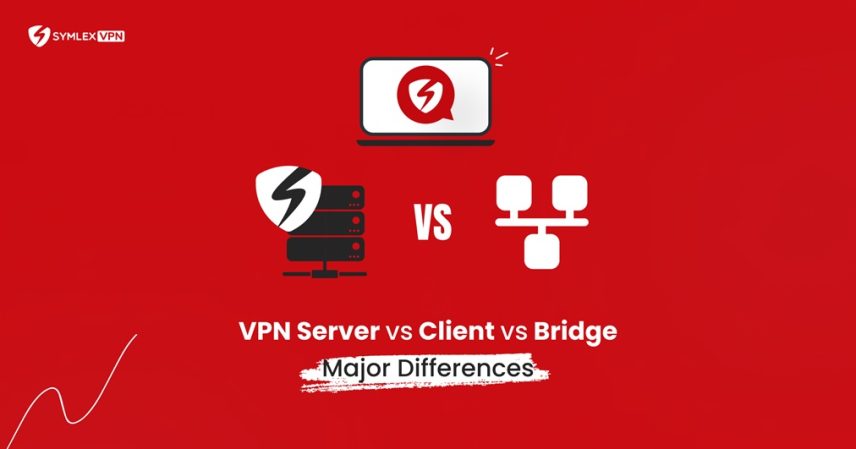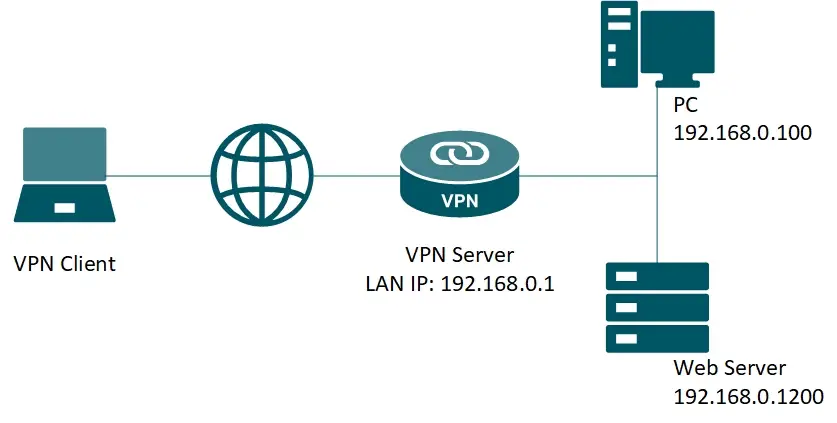VPN Server vs Client Understanding the difference between a VPN server and a client is crucial. Both play key roles in ensuring secure online communication.
A VPN, or Virtual Private Network, helps protect your internet connection by encrypting data. But how do the server and client fit into this? The VPN server is the endpoint that provides the service, while the client is the software you use to connect to that server.
By comparing VPN servers and clients, you can decide which one suits your needs best. This blog will explore the functions, benefits, and differences of VPN servers and clients, helping you make an informed choice for your online security. Let’s dive into the specifics and understand their unique roles.

Credit: doc.zentyal.org
Overviews of Contents
ToggleVpn Server Overview
In today’s digital age, internet security is crucial. A VPN server plays a vital role in securing online activities. This section provides an overview of a VPN server, its definition, and how it works.
Definition Of Vpn Server
A VPN server is a secure remote server. It facilitates encrypted connections over the internet. It helps users protect their data. This server hides the user’s IP address. It makes online activities private and secure. Businesses and individuals use VPN servers to enhance online security.
Want to learn more about VPN? This post could provide more insights. The Best Free VPNs for Torrenting: Secure and Fast Options
How Vpn Servers Work
VPN servers create a secure tunnel for data. Users connect to the VPN server. The server encrypts data before sending it to the internet. This encryption prevents unauthorized access. The VPN server also masks the user’s IP address. Websites see the VPN server’s IP, not the user’s. This process ensures privacy and security.
Setting up a VPN server involves installing specific software. This software manages the encryption and connection process. Users need to configure their devices to connect to the VPN server. Once connected, all internet traffic routes through the VPN server. This setup ensures a secure and private connection.

Credit: www.youtube.com
Vpn Client Overview
A Virtual Private Network (VPN) is a vital tool for online privacy. It encrypts your internet connection, ensuring security. In this section, we will explore the VPN client. This software is essential for connecting to a VPN server.
Definition Of Vpn Client
A VPN client is a software application. It connects your device to a VPN server. This connection secures your internet traffic. The client encrypts data before sending it. It also decrypts incoming data.
How Vpn Clients Operate
VPN clients function by creating a secure tunnel. This tunnel shields your data. The client sends encrypted data to the VPN server. The server decrypts it and forwards it to the internet. Incoming data follows the reverse path. The server encrypts it, and the client decrypts it.
Most VPN clients are easy to use. After installation, you simply enter your login details. The client then connects to a chosen server. Your internet traffic is now secure.
VPN clients support various protocols. These protocols include OpenVPN, IKEv2, and L2TP/IPsec. Each offers different levels of security and speed. Choosing the right protocol depends on your needs.
Curious about VPN? We've got more info in this linked article. Best Vpn for Japan: Unlock Fast, Secure, and Private Browsing
Key Differences
Understanding the key differences between a VPN server and a VPN client can help users make informed decisions. Knowing their roles and connection methods is essential.
Server Vs. Client Roles
A VPN server provides the service. It hosts the secure connection. It manages the data flow. The server is like a gatekeeper. It ensures safe communication.
A VPN client, on the other hand, connects to the server. It initiates the secure connection. The client is the device you use. It could be your phone, laptop, or tablet. The client requests access through the VPN server.
Connection Methods
VPN servers use various protocols. Common ones include OpenVPN, PPTP, and L2TP. These protocols encrypt data. They ensure privacy and security. The server decides which protocol to use.
VPN clients connect using these protocols. They establish a tunnel to the server. This tunnel keeps data safe. The client follows the server’s protocol. It ensures a secure connection.

Credit: symlexvpn.com
Security Features
Understanding the security features of VPN servers and clients is crucial. Both play a key role in protecting your online activities. Let’s delve into their security aspects in detail.
Encryption Protocols
VPN servers use various encryption protocols to secure data. These protocols convert data into unreadable code. Common protocols include OpenVPN, IPSec, and L2TP.
OpenVPN is highly secure and open-source. IPSec provides strong security for internet protocol communications. L2TP is often used with IPSec for added security.
| Protocol | Security Level | Usage |
|---|---|---|
| OpenVPN | High | Most VPN services |
| IPSec | Medium | Secure internet communications |
| L2TP | Medium-High | Often combined with IPSec |
Want to learn more about VPN? This post could provide more insights. Private Internet Access Vs Surfshark: Ultimate VPN Comparison
Data Privacy
VPN clients ensure data privacy by hiding your IP address. This prevents websites from tracking your location. They also encrypt your internet traffic.
This means that even if someone intercepts your data, they cannot read it. VPN servers also enforce no-log policies. This ensures that your online activities are not stored.
- Hides IP address
- Encrypts internet traffic
- Enforces no-log policies
Performance Comparison
Choosing between a VPN server and client involves evaluating performance. Performance impacts the quality of your connection. This section will explore speed considerations and reliability factors.
Speed Considerations
Speed is crucial for a smooth internet experience. Both VPN servers and clients affect speed differently.
- VPN Server: The server’s location and load impact speed. Proximity to the server usually results in faster connections.
- VPN Client: The client’s hardware and internet connection play a role. High-performance devices and fast internet enhance speed.
Below is a comparison table:
| Aspect | VPN Server | VPN Client |
|---|---|---|
| Location | Closer is faster | Less impact |
| Load | High load can slow down | Client performance dependent |
Reliability Factors
Reliability ensures a stable and consistent connection. Both VPN servers and clients have unique reliability factors.
- VPN Server: Server uptime and maintenance are crucial. Servers with high uptime offer more reliable connections.
- VPN Client: The client’s software stability matters. Reliable software reduces connection drops.
Consider these factors:
- Server uptime
- Server maintenance
- Client software updates
- Client device stability
Understanding these aspects helps choose between a VPN server and client. Each affects performance differently, impacting your internet experience.
Curious about VPN? We've got more info in this linked article. Nordvpn Vs Expressvpn: Which VPN Reigns Supreme in 2025?
Use Cases
When deciding between a VPN server and a VPN client, understanding their use cases is essential. Both serve different purposes and can be beneficial in various scenarios. Knowing when to use each can optimize your online privacy and security.
When To Use A Vpn Server
A VPN server is perfect for businesses. It allows employees to connect securely to the company’s network from remote locations. This setup ensures sensitive data remains protected. Companies can also use VPN servers to manage and monitor network traffic. This helps maintain compliance with data protection regulations.
Individuals can use VPN servers to host their own private networks. This ensures higher control over security settings. Hosting your own server also provides better connection speeds. This is because you are not sharing the server with other users.
When To Use A Vpn Client
A VPN client is ideal for personal use. It encrypts your internet connection, keeping your data safe from prying eyes. Using a VPN client is beneficial when accessing public Wi-Fi networks. It prevents hackers from intercepting your information.
Travelers often use VPN clients to access content restricted in certain regions. This includes streaming services or websites blocked by local governments. A VPN client also helps in bypassing censorship. This ensures you can browse the internet freely and securely.
Benefits Of Each
A VPN server offers centralized control and security for organizations, while a VPN client ensures secure access for individual users. Each plays a crucial role in maintaining data privacy and secure connections.
Understanding the benefits of VPN servers and clients helps you choose the best option for your needs. Both have unique advantages that cater to different requirements. Below, we will explore the benefits of each.Advantages Of Vpn Servers
VPN servers provide enhanced security and privacy. They protect your data from hackers and snoopers. They also allow access to restricted content. This is useful for streaming services or accessing country-specific websites. Businesses use VPN servers to secure remote connections. Employees can safely access the company’s network from anywhere. This ensures data security and increases productivity. VPN servers also help in maintaining anonymity online. Your real IP address remains hidden, adding an extra layer of privacy.Advantages Of Vpn Clients
VPN clients offer ease of use. They are simple to install and configure. No technical expertise is needed. This makes them ideal for personal use. They also provide instant access to VPN services. You can quickly connect to a VPN server with just a few clicks. VPN clients are portable. They can be installed on multiple devices like smartphones, tablets, and laptops. This ensures protection across all your devices. VPN clients also improve internet speed. By avoiding bandwidth throttling, you can enjoy faster browsing and streaming. Both VPN servers and clients have their own set of benefits. Choose the one that best fits your needs for security, privacy, and ease of use. “`Choosing The Right Option
Choosing between a VPN server and a VPN client can be tricky. Both have unique benefits. This section helps you decide the best fit for your needs.
Factors To Consider
Several factors can influence your choice. Here are some key points:
- Security: Does the option provide strong encryption?
- Ease of Use: How simple is it to set up and use?
- Speed: Will your internet speed be affected?
- Cost: What is your budget for a VPN?
- Compatibility: Does it work on your devices?
Making The Decision
Deciding between a VPN server and a VPN client involves weighing pros and cons. Use the table below to help make an informed decision:
| Feature | VPN Server | VPN Client |
|---|---|---|
| Security | High, customizable settings | High, but fixed settings |
| Ease of Use | Requires technical knowledge | User-friendly interface |
| Speed | May slow down | Minimal impact |
| Cost | Higher initial cost | Subscription fees |
| Compatibility | Works with various systems | Dependent on provider |
Consider these factors carefully. A VPN server might suit tech-savvy users. A VPN client could be better for those seeking simplicity.
Frequently Asked Questions
What Is A Vpn Server?
A VPN server is a computer that provides VPN services. It encrypts your internet connection.
What Is A Vpn Client?
A VPN client is software on your device. It connects to a VPN server for secure browsing.
How Does A Vpn Server Differ From A Client?
A VPN server hosts the secure connection. A VPN client connects to this server to use it.
Do I Need Both A Vpn Server And Client?
Yes, you need both. The client connects to the server to secure your internet connection.
Conclusion
Choosing between a VPN server and client depends on your needs. A VPN server offers more control and security. A VPN client is easier to set up and use. Both options provide privacy and protection online. Consider your technical skills and requirements.
Both can safeguard your online activities. Evaluate your needs carefully. Make an informed decision for a secure internet experience.





